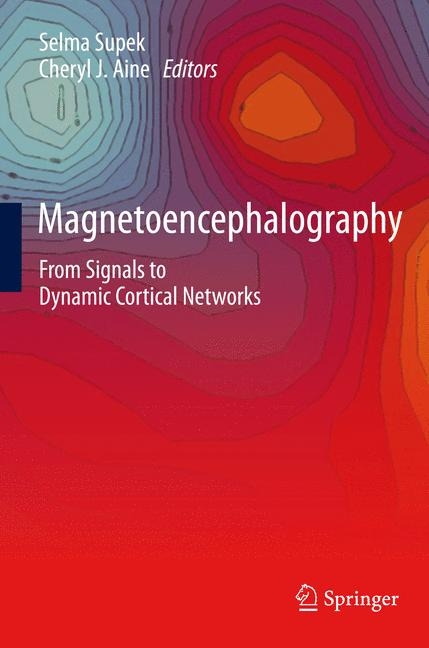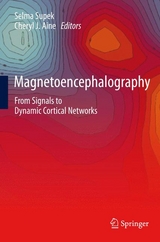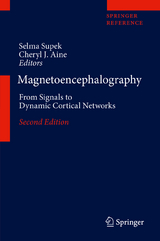Magnetoencephalography
From Signals to Dynamic Cortical Networks
Seiten
2014
|
2014
Springer Berlin (Verlag)
978-3-642-33044-5 (ISBN)
Springer Berlin (Verlag)
978-3-642-33044-5 (ISBN)
- Titel erscheint in neuer Auflage
- Artikel merken
Zu diesem Artikel existiert eine Nachauflage
This book surveys MEG basics and covers the latest methodological, empirical and clinical research. Includes tutorials on instrumentation, measurement, modeling and experimental design, discussion of open issues, future developments and new applications.
Magnetoencephalography (MEG) is an invaluable functional brain imaging technique that provides direct, real-time monitoring of neuronal activity necessary for gaining insight into dynamic cortical networks. Our intentions with this book are to cover the richness and transdisciplinary nature of the MEG field, make it more accessible to newcomers and experienced researchers and to stimulate growth in the MEG area. The book presents a comprehensive overview of MEG basics and the latest developments in methodological, empirical and clinical research, directed toward master and doctoral students, as well as researchers. There are three levels of contributions: 1) tutorials on instrumentation, measurements, modeling, and experimental design; 2) topical reviews providing extensive coverage of relevant research topics; and 3) short contributions on open, challenging issues, future developments and novel applications. The topics range from neuromagnetic measurements, signal processing and source localization techniques to dynamic functional networks underlying perception and cognition in both health and disease. Topical reviews cover, among others: development on SQUID-based and novel sensors, multi-modal integration (low field MRI and MEG; EEG and fMRI), Bayesian approaches to multi-modal integration, direct neuronal imaging, novel noise reduction methods, source-space functional analysis, decoding of brain states, dynamic brain connectivity, sensory-motor integration, MEG studies on perception and cognition, thalamocortical oscillations, fetal and neonatal MEG, pediatric MEG studies, cognitive development, clinical applications of MEG in epilepsy, pre-surgical mapping, stroke, schizophrenia, stuttering, traumatic brain injury, post-traumatic stress disorder, depression, autism, aging and neurodegeneration, MEG applications in cognitive neuropharmacology and an overview of the major open-source analysis tools.
Magnetoencephalography (MEG) is an invaluable functional brain imaging technique that provides direct, real-time monitoring of neuronal activity necessary for gaining insight into dynamic cortical networks. Our intentions with this book are to cover the richness and transdisciplinary nature of the MEG field, make it more accessible to newcomers and experienced researchers and to stimulate growth in the MEG area. The book presents a comprehensive overview of MEG basics and the latest developments in methodological, empirical and clinical research, directed toward master and doctoral students, as well as researchers. There are three levels of contributions: 1) tutorials on instrumentation, measurements, modeling, and experimental design; 2) topical reviews providing extensive coverage of relevant research topics; and 3) short contributions on open, challenging issues, future developments and novel applications. The topics range from neuromagnetic measurements, signal processing and source localization techniques to dynamic functional networks underlying perception and cognition in both health and disease. Topical reviews cover, among others: development on SQUID-based and novel sensors, multi-modal integration (low field MRI and MEG; EEG and fMRI), Bayesian approaches to multi-modal integration, direct neuronal imaging, novel noise reduction methods, source-space functional analysis, decoding of brain states, dynamic brain connectivity, sensory-motor integration, MEG studies on perception and cognition, thalamocortical oscillations, fetal and neonatal MEG, pediatric MEG studies, cognitive development, clinical applications of MEG in epilepsy, pre-surgical mapping, stroke, schizophrenia, stuttering, traumatic brain injury, post-traumatic stress disorder, depression, autism, aging and neurodegeneration, MEG applications in cognitive neuropharmacology and an overview of the major open-source analysis tools.
Part 1 : Tutorials on Measurement, Physical Basis of Analysis, and Experimental Design.- Part 2 : Source Analysis and Multi-Modal Integration.-Part 3 : Functional Connectivity and Oscillatory Activity.- Part 4 : Neurodevelopment Across Lifespan.- Part 5 : Basic and Clinical Studies.- Part 6 : Emerging Technologies
| Erscheint lt. Verlag | 20.8.2014 |
|---|---|
| Reihe/Serie | Series in BioEngineering |
| Zusatzinfo | XXI, 1013 p. 266 illus., 215 illus. in color. |
| Verlagsort | Berlin |
| Sprache | englisch |
| Maße | 155 x 235 mm |
| Gewicht | 1710 g |
| Themenwelt | Medizin / Pharmazie ► Physiotherapie / Ergotherapie ► Orthopädie |
| Technik | |
| Schlagworte | biomagnetic forward and inverse problem • biomagnetism • clinical applications of MEG • cortical oscillations and functional connectivity • Distributed Source Model • EEG and MRI • epileptogenic tissue • fetal MEG and pediatric neuromagnetism • Functional Brain Imaging • Independent component analysis (ICA) • magnetically shielded room MSR • MEG, EEG, low field MRI, fMRI • neuromagnetic measures of perception and cognition • primary motor cortex • primary sensory cortex • Source Localization • SQUID, MEG sensors • Squid Superconducting Quantum Interference Device |
| ISBN-10 | 3-642-33044-4 / 3642330444 |
| ISBN-13 | 978-3-642-33044-5 / 9783642330445 |
| Zustand | Neuware |
| Haben Sie eine Frage zum Produkt? |
Mehr entdecken
aus dem Bereich
aus dem Bereich
Spiraldynamik - programmierte Therapie für konkrete Resultate
Buch | Hardcover (2021)
Thieme (Verlag)
105,00 €





